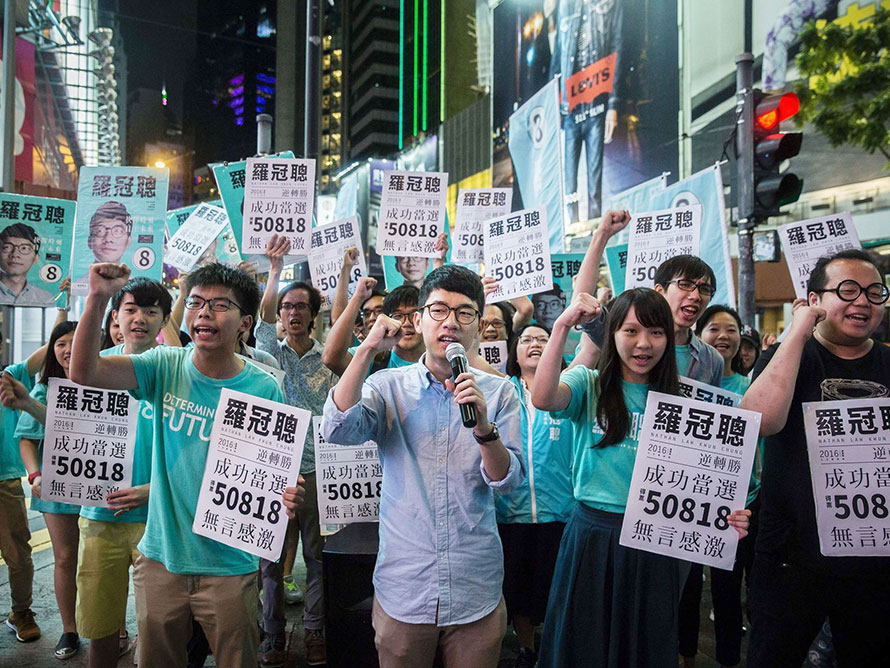Nathan Law: Hong Kong on the Brink –– A Struggle for Survival

By Candy Yang
On November 15, 2019, Nathan Law discussed his involvement as the youngest controversial activist of Hong Kong’s ongoing movement. The discussion took place in Room 120 and a live stream in Room 128 at Yale Law School.
Law began this discussion by showing pictures of the largest protest in Hong Kong in June 2019. About 2 million 30 thousand participants marched down the streets, urging the government to implement an institutional change of democracy. The Hong Kong government tried to implement an Extradition Law, which allowed China to establish a mechanism for transfers of fugitives to and from the Hong Kong court. People considered this as “a huge fellation of the One Country, Two Governments System” — “separating the legal systems” that the Chinese Government had promised of, according to Law. Law claimed that today’s Hong Kong government is a “puppet government” of the Central Government. This was one of the many incidences that ignited the largest movement in June. At first, the protests were relatively peaceful. A quarter of the people presented and protested the government to withdraw the bill by having demonstrations, but the government responded with violence. Police attacked civilians, dispersing people using tear gas and fire. People then responded with more violent confrontations. Law urged that it was important to know the “root cause” of these escalated protests. In other words, Law asked people to rethink what exactly triggered such intense conflict happening in Hong Kong during this particular era.
He introduced the history between Hong Kong, China, and Britain. In 1997, Britain officially handed Hong Kong back to China. However, people in Hong Kong were worried about their future because they feared that they would go back to a communist ruling, which resulted in a massive migration. Law did not specify the exact location where they migrated to. Law added that people considered the last decades of Hong Kong under colonial rule as “gradually approaching democracy,” and a time where “people enjoyed freedom.” In order to comfort people in Hong Kong, the Chinese government promised to have a “One Country, Two Governments System”, which guaranteed that Hong Kong would have a capitalist system. It also promised that Hong Kong could enjoy a “high degree of autonomy and democracy” and have “a prospective future.”
In the first several years after the handover, Hong Kong experienced the “One Country Two System” which the Chinese government had promised. The situation intensified, however, in 2014 when the Hong Kong government tried to implement the National Security Law of mainland China. That is to say, Hong Kong’s electoral system would be reformed. A lot of people in Hong Kong thought that this legislation would “harm the freedom of speech, the freedom of mind, and create a political prosecution on them,” Law explained. Eventually, the government withdrew the bill proposed due to The Umbrella Movement, a 79-day occupy movement against the decision of reforming Hong Kong’s electoral system. Nonetheless, it signified that there would be “more and more intervention from the Chinese Government into Hong Kong” even though “we were supposed to be guaranteed a high degree of autonomy,” Law noted.
In the next couple of years, Law continued his advocacy for Hong Kong’s pro-democracy and subsequently became a politician. “It is futile if you are going to talk with the government when they are not going to do what they have promised,” Law said from his experience of negotiating with the government, “we still ended up getting nothing, without getting democracy.” Law was jailed in 2017 because of his active participation in the Umbrella Movement of 2014 and his foundation of a new political party called Demosisto.
Law concluded that Hong Kong and Chinese ideologies are in conflict. He humbly asked China to fulfill its promises because a lot of people in Hong Kong are suffering and struggling to maintain liberal thinking. He said: “Freedom is not taken for granted. Freedom needs eternal resistance.” He urged the government to implement institutional reform, especially in regard to the police force.
The discussion ended with a Q&A session. However, students asked Law questions that mostly opposed to his perspective. One of the students said the reason why the police were using violent force was that protests did not “allow people with different opinions to survive and they are beating people from mainland China.” He asked Law whether people who were not protestors had the right to have a normal life. Law replied reasoning that “maybe we could receive information from multiple sources” and acknowledged that “Hong Kong protestors definitely made a mistake” but that “on the other hand, the institutional violence that caused suppression on Hong Kong people’s human rights is conceded as a consciousness that we should fight together. Hong Kong people are fighting for their autonomy and democracy with a broad consensus of society.”
Candy Yang is a first year in Jonathan Edwards College. You can contact her at candy.yang@yale.edu.